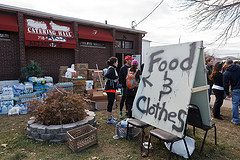Many people have passed around the article “Occupy Sandy Emerges as Relief Organization of the 21st Century,” in the weeks since hurricane Sandy.
It's a good read and worth some deeper thought. There are many reasons why Occupy Sandy took center stage in the hurricane relief efforts. Some reasons have been frequently mentioned:
-
Social media and tech savvy to organize volunteers and communicate about needs. -
Experience with coordinating the feeding and sheltering of large groups of people under adverse conditions. -
Lack of bureaucracy. Rather than paperwork and following procedure and getting permits, Occupy folks are used to just doing—and so they did, taking help from wherever they could get it.
I think I have a few to add that haven't been said as often:
-
Horizontal organizing skill. Given the number of people who like to bash government in this country, we should be very clear that what was going on here wasn't a government/not government divide. The Red Cross came in for just as much critique as FEMA (and FEMA actually did pretty well in Jersey). I believe what allowed Occupy Sandy to operate so well was not just what they lacked—institutional overhead and obstacles—but what they had. They have a positive skill base in horizontal organizing and consensus decision making—experience in how something without a top-down chain of command and single nerve center can still not be uncoordinated chaos. -
They are political. Yes, being political was an advantage here. Having a pre-existing political analysis about the haves and the have nots and a philosophy of mutual aid rather than charity put Occupy Sandy in a much better position to quickly identify the true areas of greatest need, the confidence to prioritize them, and the awareness to listen to what was really needed. It meant they were willing to work with, and in many places already were working with, community organizations, tenants associations, and congregations. It meant they were, for a small example, willing to give out clothing donations to those whose need came as much from poverty as from the storm without worrying about mission creep.
Now they are of course were not working alone. Community-based organizations, longstanding collectives, spontaneous groups of volunteers and council members also stepped up.
And I don't see the message as “just leave it all to the spontaneous grassroots” either Occupy Sandy and its partners and compatriots, as effective as they were, were not enough. Too many people were still cold, hungry, and isolated in unsanitary and dangerous conditions for too long.
Occupy Sandy and similar efforts should have had more resources and support from the larger institutions, government and non-government, which could have amplified their effectiveness dramatically by adding, for example, vehicles to transport the goods and volunteers they had in abundance. (Instead of having Mayor Bloomberg now trying to evict their relief centers.)
Also, large institutional infrastructure was and will be still needed to do things like pump out subway tunnels and restore power. Ask the folks in Jersey how they feel about FEMA right now. Pretty crucial.
Going forward, government will still be needed to build a sea wall in New York Harbor, guide the rebuilding of the Jersey Shore wisely and equitably, and enact a carbon tax and other measures that will slow down climate change and its attendant superstorms.
But the lessons of Occupy Sandy are many, and as weather disasters increase, community organizers everywhere would do well to take notice.
Photo by John de Guzman, CC BY-ND.






Comments